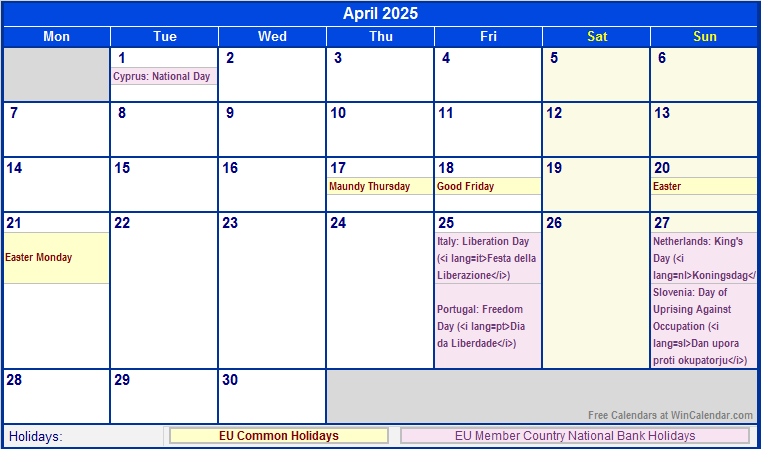A Comprehensive Guide to European Holidays in 2025
Related Articles: A Comprehensive Guide to European Holidays in 2025
Introduction
With great pleasure, we will explore the intriguing topic related to A Comprehensive Guide to European Holidays in 2025. Let’s weave interesting information and offer fresh perspectives to the readers.
Table of Content
A Comprehensive Guide to European Holidays in 2025

The year 2025 holds a wealth of exciting opportunities for travelers seeking to explore the diverse tapestry of European cultures and traditions. Navigating the intricacies of public holidays across the continent can be a daunting task, however. This comprehensive guide provides a detailed overview of key holidays in 2025, offering valuable insights for planning unforgettable journeys.
Understanding the Significance of European Holidays
Public holidays in Europe are not merely days off work; they are deeply ingrained in the cultural fabric of each nation. These celebrations commemorate historical events, religious observances, and national identities, offering a unique window into the heart of each country.
A Detailed Overview of European Holidays in 2025
January
- New Year’s Day (January 1st): Celebrated universally across Europe, this day marks the beginning of a new year and is often associated with festive gatherings and resolutions.
- Epiphany (January 6th): This Christian holiday commemorates the visit of the Three Wise Men to the baby Jesus. It is celebrated in many Catholic countries with special processions and traditional treats.
February
- Carnival (Date varies): A vibrant and boisterous festival celebrated in many European countries, Carnival marks the period before Lent and is characterized by parades, costumes, and joyous revelry.
March
- St. Patrick’s Day (March 17th): Ireland’s national holiday celebrates the patron saint of the country. It is marked by parades, traditional music, and a celebration of Irish culture.
- Good Friday (Date varies): A Christian holiday commemorating the crucifixion of Jesus Christ, Good Friday is observed as a day of solemnity and reflection in many European countries.
- Easter Sunday (Date varies): This Christian holiday celebrates the resurrection of Jesus Christ. It is marked by church services, traditional Easter eggs, and festive gatherings.
April
- Easter Monday (Date varies): A holiday observed in many European countries, Easter Monday is a day of continued celebration following Easter Sunday.
May
- May Day (May 1st): A celebration of spring and labor, May Day is observed in many European countries with parades, music, and festivities.
- Ascension Day (Date varies): This Christian holiday commemorates the ascension of Jesus Christ into heaven. It is observed in many European countries with religious services and processions.
- Whit Sunday (Date varies): This Christian holiday celebrates the descent of the Holy Spirit upon the Apostles. It is observed in many European countries with religious services and festivities.
- Whit Monday (Date varies): A holiday observed in many European countries, Whit Monday is a day of continued celebration following Whit Sunday.
June
- Corpus Christi (Date varies): This Catholic holiday celebrates the institution of the Eucharist. It is observed in many European countries with processions and special masses.
- National Day (Date varies): Many European countries celebrate their national days in June, commemorating key historical events or national figures.
July
- Bastille Day (July 14th): France’s national holiday celebrates the storming of the Bastille prison in 1789, marking the beginning of the French Revolution.
August
- Assumption Day (August 15th): This Catholic holiday celebrates the assumption of the Virgin Mary into heaven. It is observed in many European countries with religious services and processions.
September
- Labor Day (Date varies): This holiday commemorates the achievements of workers and is observed in many European countries with parades and festivities.
October
- Halloween (October 31st): While not a traditional European holiday, Halloween has gained popularity in recent years, with many countries celebrating with costume parties and trick-or-treating.
November
- All Saints’ Day (November 1st): This Christian holiday commemorates all the saints of the church. It is observed in many European countries with church services and visits to cemeteries.
- All Souls’ Day (November 2nd): This Christian holiday commemorates the faithful departed. It is observed in many European countries with visits to cemeteries and prayers for the dead.
December
- Christmas Day (December 25th): A Christian holiday celebrating the birth of Jesus Christ, Christmas is observed with festive gatherings, gift-giving, and traditional decorations.
- Boxing Day (December 26th): This holiday, celebrated in many European countries, is a day for giving gifts to those less fortunate and enjoying time with family and friends.
- New Year’s Eve (December 31st): This day marks the end of the year and is often celebrated with parties, fireworks, and special meals.
Important Notes on European Holidays
- Regional Variations: While many holidays are observed throughout Europe, there are significant regional variations in their observance. Some countries may celebrate certain holidays with greater emphasis than others, and some holidays may be unique to specific regions.
- Bank Holidays: In many European countries, public holidays are also considered bank holidays, meaning that banks and other businesses are closed. It is essential to check the specific regulations in each country before traveling.
- Cultural Sensitivity: When traveling during holiday periods, it is crucial to be respectful of local customs and traditions. This includes dressing appropriately, being mindful of noise levels, and avoiding any actions that could be considered offensive.
FAQs About European Holidays
1. Are all European holidays religious in nature?
No, while many European holidays have religious roots, others are secular in nature, celebrating historical events, national identities, or cultural traditions.
2. How can I find out which holidays are celebrated in a specific European country?
The best way to find out about specific holidays in a particular country is to consult the official government website or a reputable travel guide.
3. Should I avoid traveling to Europe during holiday periods?
While traveling during holiday periods can be more crowded and expensive, it can also be a wonderful opportunity to experience the unique atmosphere and traditions of each country. It is essential to plan ahead and book accommodations and transportation in advance.
4. What are some tips for traveling during European holidays?
- Book in Advance: Accommodation and transportation options can fill up quickly during holiday periods, so it is essential to book well in advance.
- Consider Off-Peak Travel: Traveling during the shoulder seasons (spring and autumn) can offer a more peaceful and affordable experience.
- Be Prepared for Crowds: Expect larger crowds and longer wait times during popular holidays.
- Embrace Local Customs: Take the opportunity to learn about and participate in local traditions and festivities.
Conclusion
European holidays offer a unique and enriching experience for travelers seeking to immerse themselves in the rich tapestry of European cultures. By understanding the significance of these celebrations and planning accordingly, visitors can make the most of their journeys, creating lasting memories and gaining a deeper appreciation for the diverse heritage of the continent.








Closure
Thus, we hope this article has provided valuable insights into A Comprehensive Guide to European Holidays in 2025. We appreciate your attention to our article. See you in our next article!
